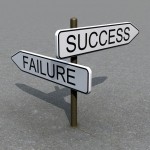Hi Everyone! Happy New Year! I think you would have to be living under a rock to miss the message that now is the time to set those New Year’s resolutions to “start your diet and lose the weight”.
I was listening to an ad by one of weight loss companies and they were touting their new service of “emotional” or “brain” coaches. I apologize as I can’t remember the exact terminology.
I was thinking, “hmmm, they felt the need to add it….. they are still searching for ways to promote success….what does that say about how much long-term success they actually have?”
If they were successful to begin with, why the need for bigger and better approaches?
And a more basic question, why are they still even in business, if they are so successful?
 Unfortunately, it is the short-term successes (immediate weight loss) and the long-term failures (regain) that keep them in business.
Unfortunately, it is the short-term successes (immediate weight loss) and the long-term failures (regain) that keep them in business.
The most commonly cited figure for the long-term failure rate of dieting is 95%.
Do you realize how large that is? It is undertaking a course of action with only a 5% chance of long-term success.
Unfortunately, because we are constantly urged, from just about everywhere, to lose weight – most people don’t realize how dismal the long-term success rate is or they just simply keep believing that dieting should work, and when it doesn’t, that the problem must be with them.
“I must lack motivation – willpower – I must have no self-control”
and on and on and on.
Societal prejudices about weight play right into this; for instance the belief that fat people are “just lazy” or “lack willpower”. And so it is easy for the failure to feel personal, despite the data.
Just to be clear – I don’t think we should give up on our health or self-care – I just don’t believe that a focus on weight loss is the way to get there.
I also believe that dieting (even under the guise of a “lifestyle change”) causes more problems than it solves.
Remember that failure rate that I was just describing?
Because it is widely believed that losing weight is just about getting on a diet and sticking to it and that the failures are personal, how do you think all of those “failures” affect self-confidence and mood?
Most women, which I have spoken with, see themselves as a failure – not that they have failed at dieting but that they, themselves as a person, are a failure!
And I am talking about intelligent, competent women!
 And then there is the problem of weight-cycling or yo-yoing, which is a pattern of losing weight and regaining it, often to a higher level than the starting weight.
And then there is the problem of weight-cycling or yo-yoing, which is a pattern of losing weight and regaining it, often to a higher level than the starting weight.
In a recent article in the Journal of Obesity (2014), Tracy Tylka, Ph.D. and her colleagues cite a study by Brownell and Rodin from 20 years ago – (20 years ago!) that described medical, metabolic, and psychological negative effects related to weight cycling.
Then theses same authors go on to cite the more recent Framingham Heart Study, (a very large group of individuals over a long period of time) which indicated that
weight cycling was strongly linked to overall mortality, as well as mortality and morbidity associated with coronary heart disease in both men and women.
Shouldn’t we be concerned with this since yo-yoing or weight cycling is such a common experience among dieters?
And what about the disordered eating that is associated with dieting?
Most people who have done much dieting know what happens when “it is over” or has been “blown”.
The experience is typically described as eating anything and everything they missed before starting over again.
According to the Binge Eating Disorder Association, “dieting/restrictive or irregular eating patterns” is one of the risk factors for developing Binge Eating Disorder, which is an eating disorder.
And successful dieting, especially that which keeps someone at a lower body weight than where their body would be genetically pre-disposed, with closer examination, might meet criteria for an eating disorder.
This, however, may go un-noticed due to the same misguided stereotypes about weight and health. They are thin or “normal” weight and so they must be healthy.
I hope that you can feel my passion around this topic!
Take a moment to listen to this great YouTube video, by Evelyn Tribole, one of the authors of Intuitive Eating, as she talks about the dangers of dieting.
We need to get the message out that dieting isn’t the answer so that when people do leave dieting behind for work on sustainable self-care, such as attuned (another word for intuitive) eating, they feel supported around this choice.
As it is now, even if people are motivated to put weight loss on the shelf and work on other health enhancing behaviors the pressure, to diet and lose weight, is so constant and pervasive that this may be scary to admit.
I hear this from my clients in their hesitation to let others know of the work they are doing.
Although, they are noticing significant changes in their self-confidence, stress levels and health indices such as blood sugar and blood pressure, because they have not necessarily lost weight, they are worried about sharing what they are doing with others, for fear of being judged.
I can understand this, and I feel sad and angry for a culture that continues with this type of judgment.
We need to counter the pressure to diet and lose weight so that people can, truly, start to take care of themselves, rather than being trapped in a vicious cycle of helplessness.
What I mean by that is this; when we continue to use weight loss as the measure of health, people will continue to try to make dieting successful.
With each failure, confidence around self-care diminishes and this often leads to the abandonment of other health enhancing activities like exercise or life-fulfilling involvement.
If I need to lose weight to be healthy and I can’t do that,
what good does it do to work on stress management or exercise? – “I need to lose weight first.”
Or, “I would love to take up skiing, swimming, join that club, etc., but I have got to lose the weight first”.
Do you see the problem here?
If you are reading this and feeling fearful about giving up the struggle to lose weight for fear of what it will mean for your health, be sure to come back, as I will write more on that in the future – I’m worried that this is getting too long.
So, I am wondering what happens for you at this time of year?
If you have a history of dieting, it is reasonable that some old wires around starting the New Year with a diet will get triggered.
I do understand the pull to diet; in the culture, in which we live, it is reasonable and understandable.
I want to remind you that the dieting industry is big business and stays in business because people need to keep coming back!
And dieting is certainly not “risk- free”.
I want to be a voice that reminds you that it is “okay” to take care of yourself in a different way
– a way that leaves the “I’ve blown it” and feelings of failure in the dust!
I would love to hear your reactions – so be sure to leave me a comment.
I appreciate you being right where you are with this!
If you liked what you read, consider using the “share” buttons, to pass this info along to others who might benefit from it and so that I will know that you found it helpful.
If you are still in the place of feeling fear around other people seeing that you liked this and so are worried about “sharing”, I certainly understand.
I wonder if leaving a comment might open up a conversation and if this conversation might then become a place for support and acknowledgment, for those of you out there moving away from dieting?
And so until next time….. how might you Flourish in your body?



0 Comments